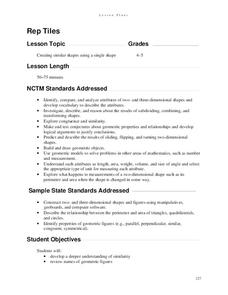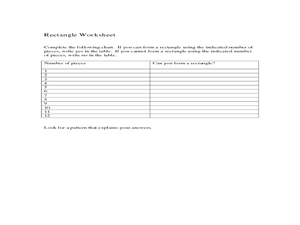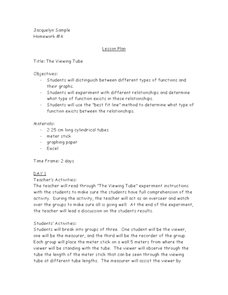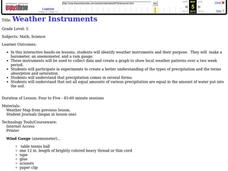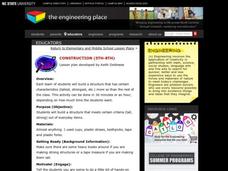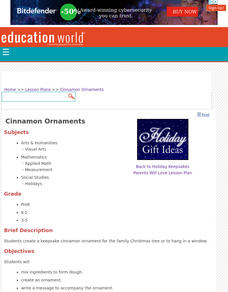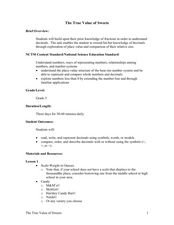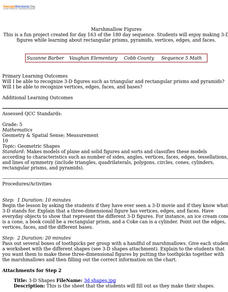Improving Measurement and Geometry in Elementary Schools
Rep Tiles
In addition to the catchy title, this lesson plan provides upper graders an opportunity to more closely scrutinize the attributes of plane figures. In particular, they focus on the similarity of different shapes. Both whole-class and...
Alabama Learning Exchange
Abundant Area
Explore the relationship between perimeter and area. Learners input the area and perimeter for shapes on the Shape Explorer website, solve problems using geoboards, complete a worksheet, create a PowerPoint presentation, and take an...
Curated OER
Exploring Scale And Ratio
Learners measure the actual size and distance of the solar system using scale and ratio. They watch and discuss a video, create a distance-scale solar system model, and compare the scale sizes of planets to their actual sizes.
Curated OER
TE Activity: Bubbling Plants
Students study a way to quantify the process of photosynthesis during a given time using the Elodea plant. They design a hypothesis that they test in the hands on activity. They compare the amounts of photosynthesis that occur during low...
Curated OER
Density - An Intrinsic Property
Learners discover the property of density while participating in a lab exercise. In this scientific measuring lesson, pupils utilize a scale to measure the density of different metal materials. They document their work and present their...
Curated OER
Area, Perimeter and Rations Using Pentominoes
Learners of all ages investigate area and perimeter through pentominoes. In this geometry lesson, students calculate the are and perimeter of different geometric shapes and describe the properties of similar and congruent shapes. This...
Curated OER
What is Air?
Learners investigate air by participating in a class experiment. In this matter measurement lesson, students identify air as a gas which consists of mass. Learners utilize a windsock or balloon to measure oxygen and explore it's true...
Curated OER
The Viewing Tube
Looking for an excellent instructional activity that incorporates math, science, and technology? Groups of three learners use a viewing tube to perform an experiment, and discover how to organize their data into an Excel...
Curated OER
Weather instruments
Students explore weather instruments. In this weather lesson, students make rain gauges, anemometers, and barometers following the instructions given in the lesson. Students set up a weather station using their instruments and record and...
Curated OER
Finding the Area of Shapes
In this area of shapes unit, upper graders participate in hands-on problem solving activities to find the formulas for the area of a parallelogram, a triangle, and a trapezoid. They manipulate the geoboard to explore relationships among...
Curated OER
Tiling the Classroom
Learners see how to identify regular polygons, how to slide, turn and flip polygons, and why certain polygons tessellate better than others. Groups create a one foot square design to be used to tile the classroom. Great lesson!
North Carolina State University
Construction
Engineering design projects serve as great opportunities for collaborative problem solving. In this case, students work in small groups designing, building, and eventually testing a structure that meets a teacher-specified objective. It...
Curated OER
History of Toys and Games
Young scholars research history of popular toys to learn when those toys were first introduced. They use measurement skills to create an accurate timeline.
Curated OER
"Polly"gon Pockets
Explore polygons with your elementary learners. Divide the class in 12 to configure the polygon puzzle before them. They list the attributes of each type of polygon they see, and if there's time, they jump on the interactive website...
Curated OER
Supplementary, Complementary, and Vertical Angles
By using circles that they cut out and label themselves, learners literally "get a grip" on the angles they identify: supplementary, complementary, and vertical. They solve missing measurements based on properties of supplementary,...
Curated OER
Terrific Tessellations
Students construct tesselations that fosters their ability to create, transform, and critique their own piece of work. This allows them to become aware of repeated patterns in math, and connect these patterns to artwork.
Illustrative Mathematics
Mile High
What is the meaning of sea level? This resource helps your class understand the meaning of elevations above, below, and at sea level. Provides for good discussion on using positive and negative numbers to represent quantities in the real...
Curated OER
Cinnamon Ornaments
Students create keepsake cinnamon ornaments to hang on the family Christmas tree or in a window. They mix ingredients to form dough, create an ornament and write a message to accompany the ornament.
Curated OER
Mirror, Mirror
Geometry young scholars use hinged mirrors to discover that the regular polygons are composed of triangles tessellating around a center point. They sketch triangles on paper models of the regular polygons having 3 to 10 sides and compute...
Curated OER
The True Value of Sweets
Measure your pupil's learning in a instructional activity designed to explore decimals by weighing different candies on a scale and recording the weight. Small groups then compare and order the decimal weights on a number line to show...
Curated OER
Spinners and Fractions
Your learners create their own spinner using different colors and analyze the likelihood of landing on certain colors. The solutions are presented as fractions.
Pennsylvania Department of Education
Build What I've Created
n this geometric instructional activity, students define and identify two dimensional shapes based on their attributes. They complete worksheets based on the geometric concepts.
Curated OER
Marshmallow Figures
Students enjoy making 3-D figures while learning about rectangular prisms, pyramids, vertices, edges, and faces. After a lecture/demo, students use marshmallows, toothpicks and a worksheet imbedded in this lesson to create 3 dimensional...
Teach Engineering
Flow Rates of Faucets and Rivers
Go with the flow and use a helpful resource. A set of two activities has learners investigate flow rates. They first determine the flow rate of a faucet by measuring how long it takes to fill a bucket. Using the results, they make a...
